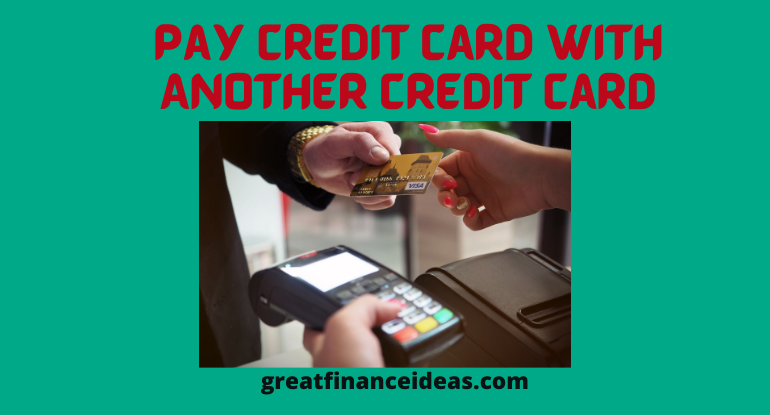Although you cannot use a credit card to pay directly with a credit card, with some solutions, you can use another credit card to pay off your credit card debt. We will discuss these solutions in this article.
Waste your credit card? Don’t worry, we are all there.
It’s a good idea to use other credit cards to pay your bills and keep your credit score intact. Unfortunately, this cannot be done.
Most credit card companies do not allow customers to use another credit card to pay off debts. Credit card companies are reluctant to allow this due to the high fees associated with processing.
It becomes very expensive for credit card companies to conduct transactions in this way. Therefore, credit card companies usually do not allow customers to pay with credit cards.
Fortunately, there are two solutions.
The first way to pay with a credit card is to make a cash advance on the credit card.
The second method is to start a balance transfer and transfer debts from one card to another.
However, before using any of them, you need to understand the advantages and disadvantages of these solutions.
Learn more: 2 Best Ways to Activate Regions Card
Table of Contents
Cash Advances: Pros and cons
Using one credit card against cash advance is a way to pay off the debt of another credit card.
After withdrawing the cash, all you have to do is deposit the cash into your checking account and pay the credit card account from there.
However, the main disadvantage of using this solution is the high processing cost.
Credit card companies usually charge their customers 5% of the amount previously charged or $10, whichever is higher.
How much breakthrough you can achieve is also limited. Your cash advance limit is much lower than your credit limit; if you have a large amount of debt, the cash advance may not be able to make up.
If you have relatively little credit card debt, withdrawing cash in advance is the right step. You will have to pay a higher handling fee, but this is the price you must pay to maintain a complete credit rating.
The Pros and cons of Balance Transfer
Under appropriate circumstances, balance transfer can be a good credit card payment method.
Please note that balance transfers may be difficult to complete. However, if you can transfer debt from a high-interest credit card to a lower one, you can save a lot of money in the long run.
The first step is to find a credit card with a low interest rate. This makes the strategy super effective. Many credit card companies offer transactions for new customers so that they can enjoy very low interest rates for a year, sometimes even more.
Taking an account where you have to pay a high interest rate (maybe 10%, 15% or even 20%) and then transferring it to a credit card that only offers 0% promotional interest is a good decision.
As long as you are disciplined and promise to repay the debt in the form of dividends, and you can pay twice, three times, and four times the minimum payment, you can use alternative balance transfer solutions to quickly repay the debt.
Although balance transfers also involve handling fees, the average handling fee for balance transfers is 3%, which is less than the 5% handling fee for cash advances. However, if you are heavily in debt, the cost may still be high.
However, using balance transfers is not always the right way to deal with large credit card accounts. If you can barely do it and want to pay with credit cards and credit cards, using this strategy is risky and counterproductive.
Most credit card companies with low promotional prices have a clause: if you miss a payment, the low interest rate will expire.
Setbacks such as unemployment or medical conditions may cause more serious problems than they are now.
However, you can use the third option to deal with credit card debt.
Learn more: 3 Ways to activate Wells Fargo Credit Card (+ NEW BONUS)
Can Debt Consolidation Loans be the solution?
Debt consolidation loans are an excellent choice for cash advances and balance transfers to repay debts.
As long as you get low interest rates and agree to pay off your debts, these loans can work well.
However, keep in mind that if you use this option, the debt term will be extended. Although the initial interest rate is low, it will rise over time. Therefore, you need to reorganize your finances to focus on repaying the loan as quickly as possible.
Things You Must Never Do To Pay Off Credit Card Debt
Debt Settlements
inding debt companies is not difficult. They charge fees and promise to negotiate with creditors and reduce debt.
However, these companies usually take their own money and do nothing to reduce debt. Stay away from these companies.
401(k) Loans
In addition to the cost of borrowing from your 401(k) account, there are also fines and taxes for withdrawals.
Never borrow money from your 401(k) account.
Learn more: 3 Ways To Activate Bluebird Card easily
Home Equity Loans
Under no circumstances should you borrow money from home to pay off debts.
If you don’t pay your debts on time, you risk losing your home. Don’t even consider borrowing money to buy a house.
If you feel overwhelmed, please contact a credit advisor. Please contact an agency accredited by the National Credit Counseling Foundation. Agents can help you understand your options.
Debt is a sign of a bigger problem, and you may need to change how you contact money.
In addition to paying off debts, you can also consult professionals to better structure your financial structure to improve your financial situation.
Conclusion
I hope some of the options listed here are will help you make better choices with your credit card payments. You will also have opportunities use the right credits options to pay back your credit card debt.



